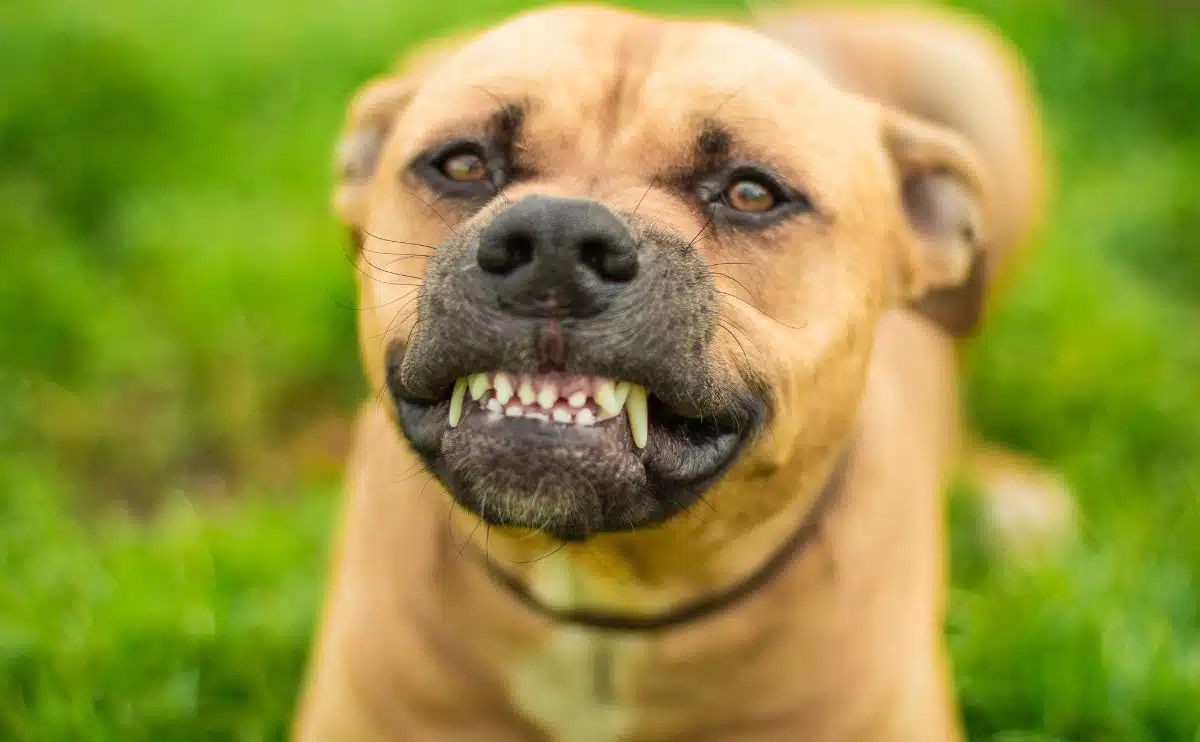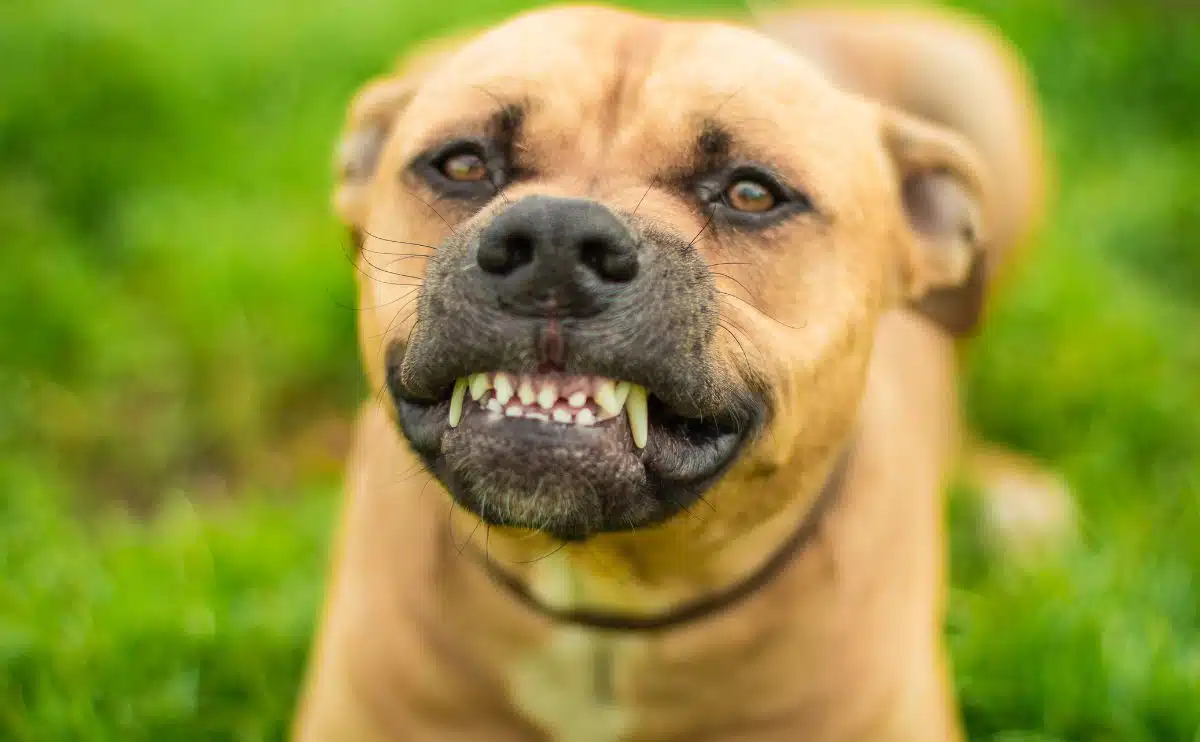
To keep the lights on, we receive affiliate commissions via some of our links. Our review process.

Dog owners often observe their pets grinding their teeth. This leads to many questions and concerns. Grinding teeth together is called bruxism and can affect dogs, cats, and even people. Though not all dogs grind their teeth, some do, and there are a few reasons behind it. While mild grinding may not be cause for concern, if it happens often or your dog clenches their jaw, there might be cause for concern. Owners need to know why pets experience bruxism, when to call the vet, and how to stop dental grinding.
Do Dogs Grind Their Teeth?
Contents
Many dogs grind their teeth. Bruxism, as this is called, also includes when pets clench their jaws or bang or chatter their jaws together. When animals do this with their mouths, they rub their top jaw along the bottom in a side-to-side motion. Not all dogs will do this, but even mild grinding can lead to long-term dental concerns for those who do. Occasionally this may not cause long-term damage, but owners must intervene if this occurs regularly.
Why Do Dogs Grind Their Teeth?
Bruxism often occurs because of an underlying dental or medical issue. Observe your dog when you notice this mouth movement and take note of the circumstances and his behavior. Grating the jaws against each other will eventually cause damage and wear and tear on the enamel and dentin. This can lead to weakened dental health and even a broken tooth.
Once the enamel weakens, they have less protection against cavities, infection, and broken teeth. This can become a severe condition. Deep infection can occur and leads to a higher risk of periodontal disease. Painful conditions and tooth weakening can also impact a pup’s eating ability, especially as they age.
Oral Pain
Oral pain is often the culprit when it comes to dogs grinding their jaws. The back-and-forth motion can be a method of self-soothing for canines. Several oral issues can cause pain, ranging from mild to very significant.
These conditions include oral masses, a broken tooth, periodontal disease, exposed pulp, tooth root infections, and oral ulcerations. It is also possible that a painful feeling can be caused by a foreign object stuck in your pup’s mouth, throat, or gums.
Dental Disease
Dental disease can affect pets as young as one or two years old and is extremely painful. This is an often-overlooked area of care, but canine dental disease is quite serious. Untreated, it can even shorten your dog’s expected lifespan.
Malocclusion & Oral Deformities
For some pups, grinding is due to malformations in the mouth. These can include misalignment and an abnormal bite, called malocclusion. Malocclusion can be dental or skeletal. A skeletal malocclusion happens because of the abnormal jaw length. Malocclusion occurs when a tooth, or multiple, is wrongly positioned. This can cause tooth damage, pain, and trauma to soft tissue.
Some pets might need tooth extractions to alleviate their discomfort. While these conditions themselves are not harmful, they can be uncomfortable and cause your dog pain. Bruxism triggered by oral deformities can sometimes be treated to lessen the discomfort. In some cases, pets can get braces, so it is worth consulting with your veterinarian and a canine dental specialist.
Gastrointestinal Distress
Gastrointestinal discomfort and distress can also be an underlying cause of canine mouth chattering. Abdominal and gastrointestinal pain can cause pets to grind their chompers. This is a self-soothing mechanism and a distraction method. The rubbing allows canines to focus on something other than their pain.
Stress & Anxiety
Many dogs experience anxiety and high stress, leading to tooth grinding. Though bruxism is a more common stress response in humans, it also happens to a lesser extent in canines. Bruxism related to stress or anxiety often occurs when pets are asleep. Some pups start chattering their jaws to deal with nervousness, social anxiety, separation anxiety, or other stress-related matters.
Focal Seizures
In some canines, focal seizures can cause this chattering. Focal seizures affect one area of the brain, rather than a generalized seizure which involves more of the brain. Focal seizures do not always cause loss of consciousness. They often cause tooth chattering, eyelid twitching, or twitching of ears and lips.
Dog Grinding Teeth In Sleep
In most cases, bruxism in sleep is related to stress, anxiety, or oral pain. Sometimes, this behavior is self-soothing or related to what your pup dreams about. This behavior can be a habit, a reaction, an underlying medical condition, or an involuntary stress response.
Why Does My Dog Grind Teeth After Yawning Or Settling Down?
Most of the time, this behavior is associated with dental or oral pain. Pain is the most common reason canines experience bruxism. The painful feeling is not always in their mouth. Sometimes it is related to abdominal, gastrointestinal, or stomach issues. In some cases, dogs may grind in response to other physical pain. This behavior is often involuntary, especially as dogs settle down and sleep.
Dog Grinding Teeth & Bad Breath
A dog chattering his jaws with noticeably foul breath likely has some form of periodontal or other diseases. This is especially concerning if a dog has new black spots on their tongue and gums. While many dogs normally have black spots on their tongue and gums, any that seem large or new, accompanied by stinky breath and bruxism, need further investigation by the veterinarian.
Bad breath in canines is sometimes a sign of liver failure or disease. Liver failure also generally includes vomiting, diarrhea, weight loss, decreased appetite, and yellowing of the cornea. Those with diabetes may have sweet-smelling breath. Canines that have oral tumors may also experience breath that smells like rotten meat. Dogs with heart disease may have bad breath, difficulty breathing, and pale or blue gums.
Any time foul breath is accompanied by bruxism, it is crucial to have your pup seen as soon as possible. This is not an emergency but often indicates a more serious underlying medical condition.
It is important to note that bad breath is also linked to kidney failure. Kidney failure is often present in canines that have advanced periodontal disease. So, paying attention to your pup’s breath is always important, especially if accompanied by bruxism.
How To Stop My Dog From Grinding His Teeth?
Owners must always pay attention to bruxism in their pets. Whether it happens when they are awake or asleep, if this happens more than once or twice, it’s imperative to have your dog seen by the vet. Because this is often an indicator of an underlying disease, your vet will want to perform an exam and some tests to rule out any medical issues. These will usually include lab tests for blood and urine and imaging to check organ function. The exam will also include an oral examination and possible cleaning.
Once an underlying medical condition has been identified, your vet will set your pup on the right course of treatment. This may involve medication, as well as changes in the environment, and behavior training. If your pup suffers from dental disease, treatment can include cleaning, medicine, or tooth extraction. If there is no underlying medical cause, this is good news, but it likely means that a pup might suffer from stress or anxiety.
Pain and jaw chattering caused by gastrointestinal disorders are treated through changing diet and pain relief or anti-nausea medications. Some pets may require surgery if their condition is more serious.
Bruxism caused by anxiety and stress is helped if the pet’s environment is modified and the stressors are identified and eliminated. If bruxism is related to stress, owners may consider professional dog training or animal behaviorists to help with behavior modification. Desensitization treatment, positive reinforcement, socialization, and more training on both the part of the pet and the owner are also necessary. On top of that, there are also pheromone diffusers that may help alleviate some of those feelings of stress.
Owners who notice any oral movement in their pet should start by checking the mouth for any obvious signs of injury, obstruction, or disease. It is also essential to check other symptoms your pet may have. Those are often quite subtle and may be hard to notice at first.
Provide your dog with plenty of chew toys and tasty treats. For canines who are experiencing bad breath, dental chews are a good idea. By providing these other options for chewing, you can discourage your pup from this destructive behavior.
Dogs grinding their teeth is always something owners should take seriously and seek medical advice about. Canines start chattering or grinding their jaws for several reasons, both when they are awake and asleep. Because there is a wide range of issues and the severity of what may be causing this behavior, owners must work closely with their vets to rule out and treat any medical or oral problems if necessary. Braces, medication, and other treatment may be required. Regular dental cleanings and teeth brushing by owners are essential to prevent periodontal and dental disease. Remember this crucial part of canine care, whether or not your pup is experiencing teeth grinding.
Tagged With: Dental